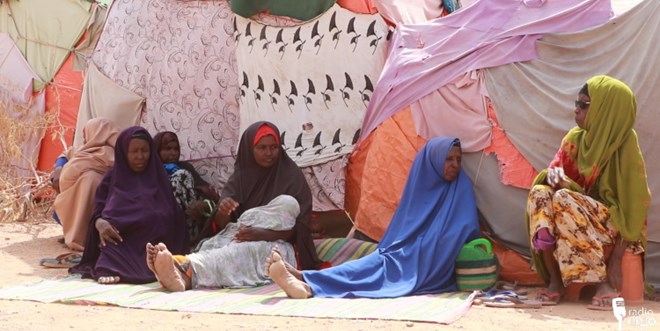
Wednesday August 17, 2022

Recent arrivals outside their makeshift shelter in Nasteho IDP camp, /File Photo/Ergo
(ERGO) – Seventy-year-old Somali grandmother Hawo Olad Osoble, who has failing eyesight, is sleeping outside with eight grandchildren in her care, after giving up rebuilding their flimsy hut that keeps being blown down by strong winds buffeting their camp in Adado, central Somalia.
“We feel cold, we are shivering and lonely, I sometimes call out to the neighbours, but often there is no one to help us! We don’t have the strength to do the construction of the hut anymore,” said Hawo.
She and her grandchildren travelled to Adado in Galgadud by car from Caad, north of Harardhere in Mudug, arriving on 15 March. They left fearing growing conflict in their home area, with reported incidents of Al-Shabab militia clashing with the locals.
The children’s parents took a different route and travelled to the rural areas with their last remaining 100 goats, sending back some small amounts of money to Hawo to buy the children’s food and other basics.
They are among 3,000 families now living in Badbado, Daryel, Hebed, and Harardere IDP camps southeast of Adado. The area has few trees to act as a windbreak and is known as a windy place. They face food and water shortage, while the weather compounds their misery.
Fadumo Mohamud Mohamed and her husband and 10 children have been rebuilding their hut every morning as the winds keep battering them in Harardhere IDP camp, destroying their structure typically made of cartons, pieces of cloth and plastic bags.
Fadumo said the wind starts around three o’clock in the afternoon and blows throughout the night until the morning. As soon as they rebuild, the huts are blown away again.
“They quickly get dismantled as they are weak structures. We are now running out of building materials…sometimes the houses collapse at night while we are sleeping, and the ground is very hard so we cannot dig,” said Fadumo.
She is especially worried about her seven-month-old baby, who has a constant cough although she has not been able to take him to hospital.
They have received $90 monthly cash aid from the Somali Red Crescent since June, which supports their food expenses. But they have no other source of income as Fadumo’s husband is out of work. The only skill he knew was animal husbandry but they lost all their 150 goats to the drought back in Harardhere, Mudug, earlier in the year.
“We don’t have any plans, we pray to God, I don’t have relatives even in Adado and there is nowhere else we can move to, our livestock have died, our farm has failed due to lack of rainfall, I have only been able to whisk away my children,” said Fadumo.
Abdirahman Abdishakur, the Somali government’s special envoy for drought response, visited some of the camps on 5 August. He said a swift humanitarian response to these families’ food and shelter needs was urgently required. Many of those he met were children and elderly people living in a dire situation, often separated from the rest of their families by the drought and conflict.
“Besides their terrible situation, these families have been neglected. We have to present their situation to people that can help them, we are here to present how serious the situation is,” the envoy said.